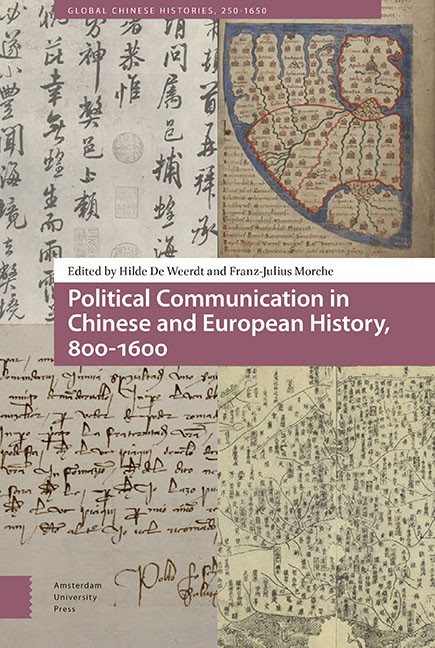Book contents
- Frontmatter
- Dedication
- Contents
- List of Figures and Tables by Chapter
- Acknowledgments
- Introduction
- Part I Communication and the Formation of Polities
- Part II Letters and Political Languages
- Part III Communication and Political Authority
- Part IV Memory and Political Imaginaries
- Epilogues
- List of Contributors
- Index
6 - Yao Mian’s Letters: The Epistolary Networks of a Late Song Literatus
Published online by Cambridge University Press: 17 June 2021
- Frontmatter
- Dedication
- Contents
- List of Figures and Tables by Chapter
- Acknowledgments
- Introduction
- Part I Communication and the Formation of Polities
- Part II Letters and Political Languages
- Part III Communication and Political Authority
- Part IV Memory and Political Imaginaries
- Epilogues
- List of Contributors
- Index
Summary
Abstract
This chapter examines literati correspondence in the late Song Dynasty (960-1279) through a case study of letters to officials by the quirky late Song Dynasty literatus Yao Mian (1216-1262). Yao was a brilliant prose master who was desperate for political recognition. Over the course of his volatile career, he used letters as a means of social interaction, to establish and cultivate relations of patronage, and to convey political information or demands. The chapter explores the subtle differences in tone that reflected Yao Mian's relationships with inferiors and superiors, and reveals how movement up and down the political ladder influenced his letter-writing. This case study of a single man's correspondence demonstrates the varied roles of epistolary communication in Song social and political life.
Keywords: Yao Mian, epistolary culture (China), Song Dynasty
As explained elsewhere in this volume, scholars of China have only recently begun to explore letters as objects of literary and historical analysis. That said, for the Song Dynasty (960–1279) in particular we now have several important studies of epistolary culture. They have begun to show how Song letters were used to maintain relationships, carry on intellectual debates, transmit news, and realize political agendas. They have also demonstrated the usefulness of letters for tracing trace social, political, and intellectual networks.
The current chapter aims to contribute to our growing understanding of the various ways letters functioned in Song men's social and political lives, as well as to illustrate some of the conventions of epistolary writing in the Song. I focus on the correspondence of a late Song literatus named Yao Mian 姚勉 (1216–1262). Yao is a fascinating and somewhat tragic character: born in the relative backwater of Xinchang 新昌 (present day Yifeng 宜豐 county, in Jiangxi), he came of age when the Song government was already in decline, threatened by Mongol invasion and led by a factionalized court and a distracted and self-indulgent emperor. Although he was a top-ranked degree-holder, served briefly at court, and corresponded with some of the most eminent political figures of the period, Yao Mian's own political position was marginal. His examination success came late, and both personal and political factors kept him out of office for the majority of his adult life. We know about him today almost exclusively through the survival of his own collected works.
- Type
- Chapter
- Information
- Publisher: Amsterdam University PressPrint publication year: 2021



